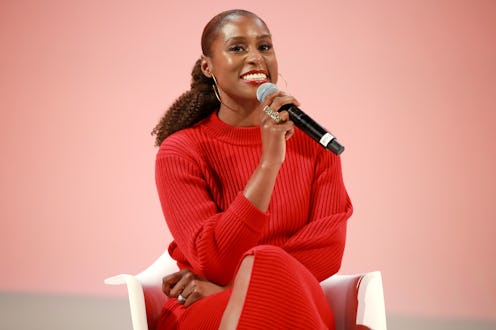
In Bustle's Quick Question, we ask women leaders all about advice — from the best guidance they've ever gotten, to what they're still figuring out. Here, Issa Rae tells Bustle about the advice she received when launching her web series Awkward Black Girl, why she surrounds herself with driven women, and the challenges of running her own production company.
Issa Rae has a lot going on these days. When we caught up with the writer, producer, and actor over the phone in early March, she was in between production meetings for season 2 of A Black Lady Sketch Show and working on the music selection and edits for HBO's Insecure, which is currently in its fourth season.
"I'm always going to be ambitious ... but I also have the wisdom to know that I can't spread myself too thin," Rae tells Bustle. "That's why I rely on other people around me. I work with a team of very smart, capable, and equally ambitious women."
She started her own company, Issa Rae Productions in 2012 to support writers, producers, and directors of color. And while she finds running a company rewarding, Rae is still getting used to being the boss.
"We're producing television shows and movies, we're putting on events, and we're shepherding the next generation of talent, which is exciting, but the hardest part is managing other people," says Rae, who's partnering with The Ambition Project by American Express, an initiative that inspires women to own their drive through roundtable sessions and networking events. "As you grow, navigating those workplace relationships is a very specific skill in and of itself, so that's the next challenge that I'm willing to take on."
Here, Rae shares how she unwinds, her advice for aspiring female creators, and her back-up plan before Awkward Black Girl went viral in 2011 and launched her career.
Who is the person you often go to for guidance or mentorship?
IR: I seek out advice from my team members; I trust them. Whenever I'm up against an important project, industry-related things, or when I'm trying to strategize next moves for Issa Rae Productions, I really listen a lot to the people around me.
How do you turn your brain off and recharge?
IR: I can't wait to turn off my brain. [Laughs.] As soon as I come home and lay on that couch, that's the last of me. I might respond to a few emails, but then I will just dive into a mindless reality show or a book and then fall asleep. Right now, I'm actively reading Sprint: How to Solve Big Problems and Test New Ideas in Just Five Days — it helps you to create with processes to help your team members come up with ideas and successfully execute those ideas.
What was the best piece of advice you received when you were launching Awkward Black Girl?
IR: To take it very seriously and produce it like a real show. Production quality-wise, those first couple of episodes were extremely low budget because I was broke. Even skit-wise, I wasn't necessarily writing the episodes in script format and my friend, who came on board and ultimately produced the show, said to me, "Let's hire a real crew and write this script in TV format and take it seriously" — and the show only got better from there.
And the worst advice?
IR: To take the word "Black" out of Awkward Black Girl, so that it would be more approachable to all audiences. I'm glad I didn't listen to that advice because I didn't want anybody to watch the show who was intimidated by that title.
Because I'm a shy person, it was hard for me to introduce myself to people and ask for help, but I found that as soon as I started doing the work, people started coming my way.
Did you have a back-up plan?
IR: I'm a Capricorn, so I always have a plan or something to fall back on. The backup plan before Awkward Black Girl took off was education. I was wrestling between business school and law school [after graduating from Stanford University]. Even if I had attended business or law school, I was still always going to be creative and continue to write. I'm a firm believer in acquiring a skillset, but I always knew what I wanted to do.
What would you tell young women just starting out in film?
IR: To find their people. One of the things that was so important for me was just finding those people who I could rely on and who I could grow with — it's not easy to do things by yourself. Because I'm a shy person, it was hard for me to introduce myself to people and ask for help, but I found that as soon as I started doing the work, people started coming my way.
This interview has been edited for length and clarity.